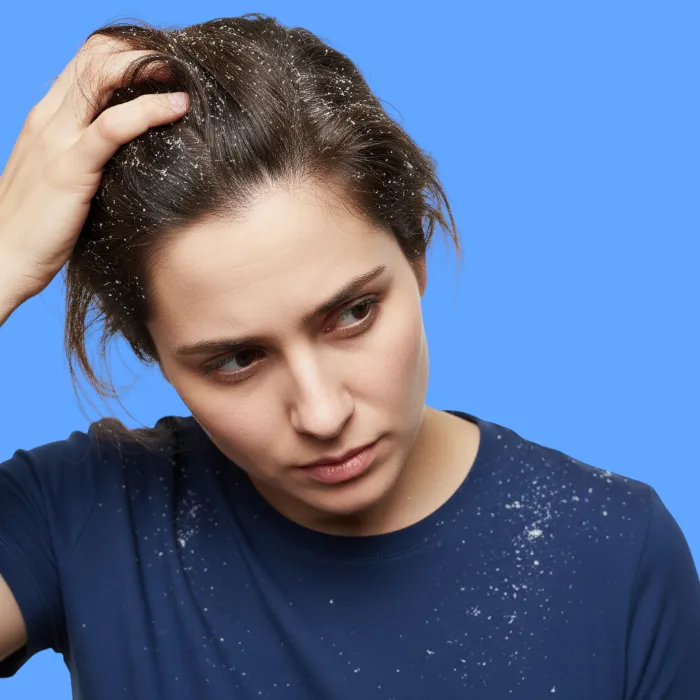What is dandruff?
Dandruff is a common skin condition that affects the scalp and leads to the appearance of white or yellow flakes of dead skin between the hair.
It is often accompanied by annoying itching and may cause social embarrassment. Its severity varies from person to person, and it can be oily and sticky or dry and light, often worsening in winter.
What are the causes of dandruff?
There are several common causes of dandruff, including:
- Seborrheic dermatitis
- Overgrowth of malassezia fungus
- Dry scalp
- Allergy to hair care products
- Psychological stress and fatigue
- Harsh weather changes, especially in winter
- Using unsuitable shampoos
- Nutritional deficiencies such as zinc and vitamin B
What are the common symptoms of dandruff?

Common symptoms that patients may experience include:
- Appearance of white or yellow flakes on the scalp
- Persistent and annoying itching
- Redness or irritation of the scalp
- Burning sensation or sensitivity
- Temporary hair loss in some cases
- Oily flakes sticking to hair or clothes
When should you see a doctor?
It is recommended to consult a doctor urgently if any of the following occurs:
- Dandruff persists despite using medicated shampoo
- Appearance of red or excessively scaly patches
- Severe itching affecting sleep or comfort
- Noticeable hair loss
- Signs of infection or inflammation on the scalp
What are the treatment options for dandruff?
There are several ways to treat dandruff, including:
- Using medicated shampoos containing zinc pyrithione or ketoconazole
- Topical treatments like antifungal creams
- Natural remedies such as tea tree oil or aloe vera
- Improving diet and increasing intake of zinc and vitamin B
- Avoiding products that irritate the scalp
- Reducing stress and psychological fatigue
Can dandruff be cured?
Yes, dandruff can be largely controlled, but full recovery depends on the underlying cause. In cases caused by dryness or allergies, it can be completely eliminated.
However, in chronic cases like seborrheic dermatitis, regular treatment may be needed to maintain scalp health.
What are the prevention tips for dandruff?
Here are some tips to prevent dandruff:
- Wash hair regularly with a suitable shampoo
- Avoid using heavy oils or irritating products
- Moisturize the scalp with natural oils like almond oil
- Reduce use of heat styling tools
- Eat a balanced diet rich in vitamins and minerals
- Avoid stress and fatigue as much as possible
What are the possible complications of dandruff?
Some complications may occur if treatment is neglected, such as:
- Scalp inflammation
- Hair loss
- Appearance of chronic skin patches
- Increased itching and irritation
- Secondary fungal or bacterial infections
Common questions about dandruff
Does dandruff cause hair loss?
In some cases yes, especially if accompanied by inflammation.
Can oils be used to treat dandruff?
Some oils like tea tree oil are helpful, but heavy oils may worsen the condition.
Does dandruff affect children?
Yes, and it often appears as cradle cap in infants.
Can dandruff be cured completely?
It depends on the cause, but it can be effectively controlled.
Article summary
Dandruff is not just a cosmetic issue, but a skin condition that requires understanding and care. It is important to identify the causes, avoid triggers, and choose the right treatment based on the type of dandruff.
Taking care of the scalp, nourishing it, and avoiding stress greatly helps in prevention and treatment If symptoms persist, do not hesitate to consult a specialist.